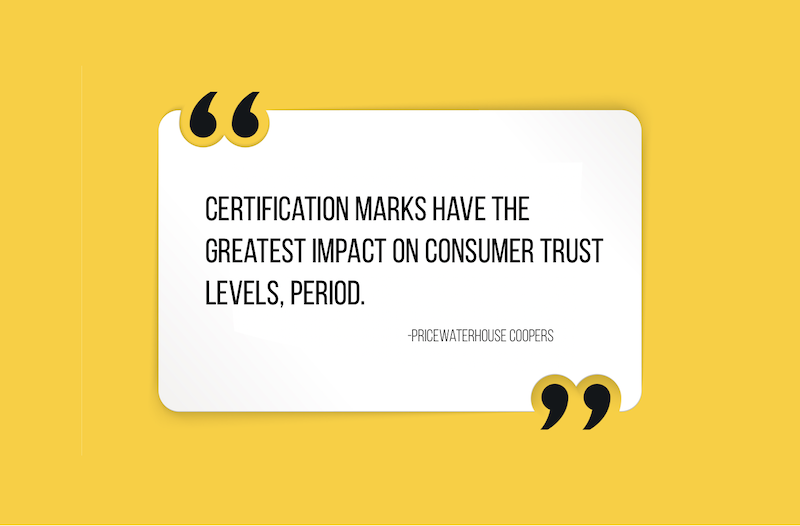Top 5 Ways Food Brands Can Increase Consumer Confidence

People Buy from Brands they trust. If there is anything that should be the top priority of a brand owner, it is increasing consumer confidence with the consumers of your brand. Recent studies by HuTrust found that when people trust a brand, 83% will recommend it to other people, 82% will use its products frequently, 78% will look to it first for the things they want, 87% will give its new products a chance, and 50% will pay more for its products and services than the competitor. Therefore, if you want people to buy more, try more, and pay more— brand trust is essential. But building trust and confidence among your customers isn’t always an easy task. You can provide each one of the free samples or a good discount, but this often results in a loss. So, how can you build strong consumer confidence without sacrificing too much? Here we offer you 5 of the top most effective ways to increase consumer confidence in your brand.
5. Next-Level Product Transparency.
Increase consumer confidence through transparency by letting consumers know how your product is made— is an easy and low-hanging fruit because most companies don’t feel comfortable doing it. Giving consumers an ‘insider’s look’ into your manufacturing process—either in the form of a YouTube video or guided tours— helps you increase consumer confidence.
4. Build Your Social Media Platform.
Social proof is a psychological phenomenon referring to people’s reliance on the feedback and actions of others to determine the trust and reliability of a brand and is a concept as old as marketing itself.
Have you ever looked at someone’s Instagram or Twitter followers count to gauge whether or not to take them seriously? When a consumer learns of a new product, more and more often they look at the brand’s social media platforms to get a better idea of the company and sense of authority— instead of their website. This is done by looking at the number of followers, and is a form of social proof marketing.
The number of followers a brand has helps “social proof” the brand, and helps individuals identify whether the brand is strong and reliable— or otherwise. Thus, building a social media platform can help brands, especially food brands, increase consumer confidence.
3. Perfect Your Testimonials.
Testimonials are perhaps one of the oldest and best forms of social proofing. They serve as the evidence to support your marketing claims.
However, people don’t always believe the testimonials they read on websites. In fact, a survey conducted by Testimonial Shield revealed that more than 90% of the participants surveyed believed the testimonials they read on websites were made up by the brands. That means that testimonials can actually backfire and decrease consumer trust!
So how do you ensure that your testimonials appear real? Add images of the person giving the testimonial, or add links to their website or embed from social media, if possible. Directly embedding testimonials from social media is best because users can click directly on the testimonial.
2. Tell Your Story.
When we meet a stranger, we assess them based on the stories they share about themselves: who they are, what they do for a living, and what they believe in. If we connect with their story, we move forward in the relationship because we get them and we trust them. Connecting with a brand is no different.
Telling your story effectively helps you have an emotional relationship with your consumers. While some elements of your brand may be forgotten, your story— if impactful— will not. Remembering your story over your competitors is another way brands can use the hard-wiring in our brains to increase consumer confidence.
1. Get Product Certifications to Increase Consumer Confidence
Of course we are going to suggest product certification. We are a certification organization, after all. But do you know why certification has the greatest impact on consumer trust levels?
Trust in the global food chain is abysmally low: a mere 7% according to retail insurer NFU Mutual. And worse, from the consumer standpoint, it can be a tedious and time-consuming task to make an informed decision on a product based on ingredient statements alone.
Luckily, third-party certification is an easy way to improve credibility, solve issues of product differentiation between competitors, and increase consumer confidence for food brands. Consumers recognize that product certifications indicate that a product or brand has been independently verified by a regulatory agency to meet specific sets of standards and food values. Think of product certification as next-level social proof heuristics for a brand.
Studies by marketing analytics company Cone Communications and Globescan suggest that the majority of consumers agree that the best way to verify a product’s claims are through independent third-party certification. 76% of the consumers studied agreed that independent third-party certifications increased their confidence and trust in a brand over their competitors.
Third-party certifications are a critical strategy to increasing consumer trust— and number one in increasing brand trust. While trust may have seemed like a warm and fuzzy concept, it delivers cold, hard results for brands.
How Increasing Consumer Confidence Impacts Sales
According to the 2016 SPINS.com Trend Watch Report, sales of uncertified, Paleo-positioned products grew 181% over the year. During that same period, Paleo-positioned, certified products had a sales increase of 466%. That’s a difference of 285% for certified products versus uncertified products for the same period. This is a clear indicator of the benefits of third-party certification increasing consumer confidence. It is also a clear indication of how trust increases sales.
The Bottom Line
While third-party certification like keto certification is worth it because it increases consumer confidence and trust more than other strategies, brands can always employ other tactics to increase trust. Nevertheless, no matter what strategy is employed, increasing consumer trust should be a priority for any brand focused on long-term success and brand loyalty.


